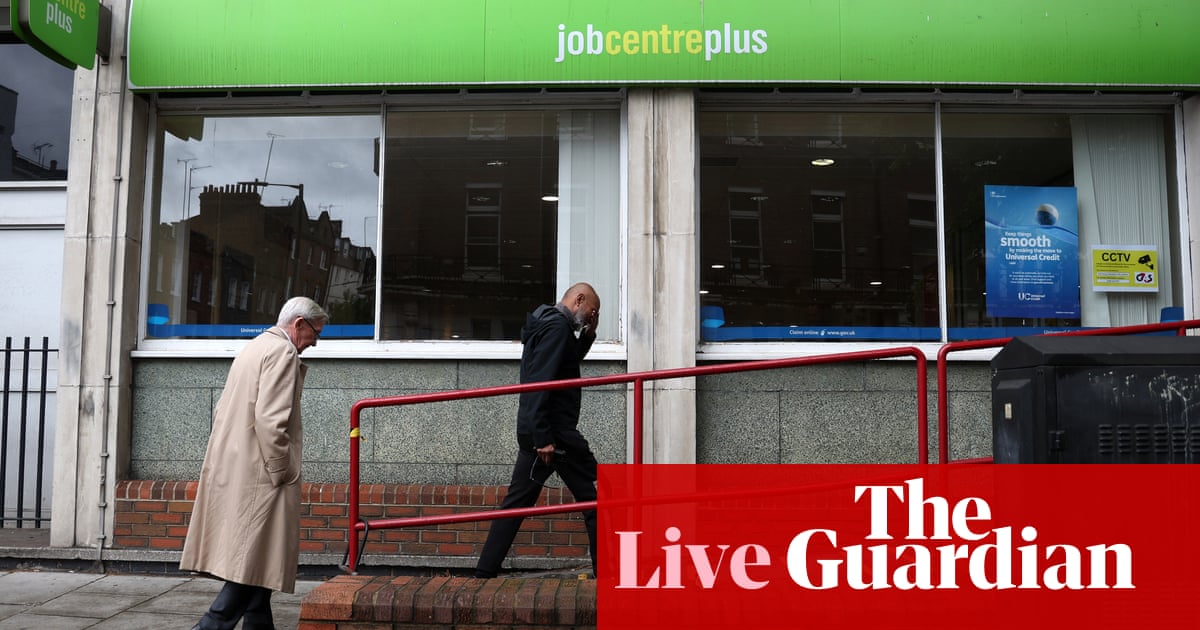Hunt and Stride accused of ‘gaslighting public’ over unemployment claims
Chancellor Jeremy Hunt and work and pensions secretary Mel Stride have been accused of âgaslighting the British publicâ, after claiming the unemployed have âample opportunitiesâ to find a job.
Hunt and Stride have written in the Times today that thereâs no reason to be stuck on benefits.
âWeâve been clear that unemployment benefits should only be there as a safety net, not a lifestyle choice. With around 900,000 vacancies in the economy there are ample opportunities for people to get on and get ahead in the world of work.â
Their comments come after the UK unemployment rate yesterday rose to 4.3% in the first quarter of this year, with the number of people out of work and looking for a job rising by 166,000 to 1,486m.
The number of vacancies fell to 898,000 and company payrolls shrank.
The revised estimate of employees on the payroll in March 2024 was down 5,000 on the month. The provisional estimate for April 2024 was down another 85,000.
Read Earnings and employment from Pay As You Earn Real Time Information â¡ï¸ https://t.co/hrn1CJDwXF pic.twitter.com/3yypnwEYoM
— Office for National Statistics (ONS) (@ONS) May 14, 2024
The number of people âeconomically inactiveâ jumped to almost 9.4m, due to more people becoming temporarily sick, long-term sick, or retiring. The rise in sickness has been blamed on the long waits for treatment on the NHS, which prevent people getting back to work.
TUC General Secretary Paul Nowak says the government should focus on bringing down NHS waiting lists, rather than âpunching downâ by suggesting unemployment is a lifestyle choice.
Nowak tells us:
âMinisters are gaslighting the British public on the state of the UK labour market.
âUnemployment shot up by over 160,000 over the last quarter and record numbers of people are becoming economically inactive because they are too sick to work.
âInstead of punching down, the Tories should be tackling our sky-high waiting lists and improving access to treatment.
âAnd they should be laser-focused on improving the quality of work in this country.
âPeople need jobs they can build a live on. But under the Conservatives we have seen an explosion of low-paid and insecure work that has led to eye-watering levels of in-work poverty.
âBefore handing out lectures, Jeremy Hunt and Mel Stride should try surviving on a zero-hours contract.â
Stephen Evans, chief executive at Learning and Work Institute, agrees that itâs wrong to suggest there is a widespread sicknote culture, or that unemployment benefits are a lifestyle choice for many.
Evans explains that more needs to be done to help people improve their skills, and access to the jobs market, saying:
âMany people who are out of work want to work, including 1.7 million who are economically inactive. But only one in ten out-of-work disabled people get help to find work each year and many people canât find work that fits with caring responsibilities or health conditions.
Itâs wrong to suggest that unemployment benefits are a lifestyle choice for many or that thereâs a widespread sicknote culture. Rather, thereâs not enough support to improve skills or find work and employers need to look at job design and terms and conditions to attract potential workers.â
In their Times article, Hunt and Stride write that the UK economy is doing âfar better than many would have you believeâ, after it emerged from recession last week, though they do concede there have been âbumps, twists and turnsâ in the economic recovery.
Key events
IEA cuts forecast for growth in oil demand
The International Energy Agency (IEA) has cut its forecast for oil demand growth this year, due to weakening demand.
The Paris-based energy watchdog has lowered its growth outlook for 2024 by 140,000 barrels per day (bpd) to 1.1 million bpd, largely citing weak demand in developed OECD nations.
In its latest monthly report, the IEA says that âweak deliveries, notably in Europeâ pushed demand across the OECD into contraction in the first quarter of this year.
It says:
Poor industrial activity and another mild winter have sapped gasoil consumption this year, particularly in Europe where a declining share of diesel cars in the fleet were already undercutting consumption.
The IEA adds that the health of global oil demand will probably be âa key topic for discussionâ when OPEC+ ministers meet in Vienna on 1 June.
EU sticks with eurozone growth forecast as geopolitical risks loom
The European Commission has warned that external economic risks to Europeâs economy have risen in recent months, due to the ongoing Russia-Ukraine war and the Israel-Gaza conflict.
In its new spring forecasts, the EC says that risks originating from outside the EU have increased in recent months amid âtwo ongoing wars in our neighbourhood and mounting geopolitical tensionsâ.
It says:
Global trade and energy markets appear particularly vulnerable. Moreover, persistence of inflation in the US may further delay rate cuts in the US, but also beyond, resulting in somewhat tighter global financial conditions.
On the domestic front, EU Central Banks may also postpone rate cuts until the decline in services inflation firms
The EC also says that Europeâs economy staged a comeback at the start of the year, following a prolonged period of stagnation, with growth of 0.3% in the last quarter (see previous post).
It is sticking with its forecast that the eurozone will grow by 0.8% this year, but trimmed its forecast for growth in 2025 to 1.4%, slightly lower than the 1.5% predicted in February.
But it has also lowered its inflation forecasts. Eurozone inflation, which averaged 5.4% last year, is forecast to slow to 2.5% this year, and then 2.1% in 2025 â virtually back to the European Central Bankâs target.
Paolo Gentiloni, Commissioner for Economy, says:
The EU economy perked up markedly in the first quarter, indicating that we have turned a corner after a very challenging 2023.
We expect a gradual acceleration in growth over the course of this year and next, as private consumption is supported by declining inflation, recovering purchasing power and continued employment growth.
But, Gentolini adds, âdownside risks have increasedâ as âtwo wars continuing to rage not far from homeâ.
Confirmation that eurozone is out of recession
Just in: We have confirmation that the eurozone escaped recession at the start of this year, but not as briskly as the UK managed.
Data provider Eurostat has reported that eurozone GDP rose by 0.3% in the January-March quarter, in line with its flash estimate last month. That follows two quarters in which the eurozone shrank by 0.1%, which put it in a technical recession.
Among major eurozone economies, Germany avoided recession by growing by 0.2% in Q1 2024, a growth rate matched by France, while Spain grew by 0.7 and Italy by 0.3%.
The UK expanded by 0.6% in the January-March quarter, beating both the eurozone and the US which grew by 0.4%.
Hunt and Stride accused of ‘gaslighting public’ over unemployment claims
Chancellor Jeremy Hunt and work and pensions secretary Mel Stride have been accused of âgaslighting the British publicâ, after claiming the unemployed have âample opportunitiesâ to find a job.
Hunt and Stride have written in the Times today that thereâs no reason to be stuck on benefits.
âWeâve been clear that unemployment benefits should only be there as a safety net, not a lifestyle choice. With around 900,000 vacancies in the economy there are ample opportunities for people to get on and get ahead in the world of work.â
Their comments come after the UK unemployment rate yesterday rose to 4.3% in the first quarter of this year, with the number of people out of work and looking for a job rising by 166,000 to 1,486m.
The number of vacancies fell to 898,000 and company payrolls shrank.
The revised estimate of employees on the payroll in March 2024 was down 5,000 on the month. The provisional estimate for April 2024 was down another 85,000.
Read Earnings and employment from Pay As You Earn Real Time Information â¡ï¸ https://t.co/hrn1CJDwXF pic.twitter.com/3yypnwEYoM
— Office for National Statistics (ONS) (@ONS) May 14, 2024
The number of people âeconomically inactiveâ jumped to almost 9.4m, due to more people becoming temporarily sick, long-term sick, or retiring. The rise in sickness has been blamed on the long waits for treatment on the NHS, which prevent people getting back to work.
TUC General Secretary Paul Nowak says the government should focus on bringing down NHS waiting lists, rather than âpunching downâ by suggesting unemployment is a lifestyle choice.
Nowak tells us:
âMinisters are gaslighting the British public on the state of the UK labour market.
âUnemployment shot up by over 160,000 over the last quarter and record numbers of people are becoming economically inactive because they are too sick to work.
âInstead of punching down, the Tories should be tackling our sky-high waiting lists and improving access to treatment.
âAnd they should be laser-focused on improving the quality of work in this country.
âPeople need jobs they can build a live on. But under the Conservatives we have seen an explosion of low-paid and insecure work that has led to eye-watering levels of in-work poverty.
âBefore handing out lectures, Jeremy Hunt and Mel Stride should try surviving on a zero-hours contract.â
Stephen Evans, chief executive at Learning and Work Institute, agrees that itâs wrong to suggest there is a widespread sicknote culture, or that unemployment benefits are a lifestyle choice for many.
Evans explains that more needs to be done to help people improve their skills, and access to the jobs market, saying:
âMany people who are out of work want to work, including 1.7 million who are economically inactive. But only one in ten out-of-work disabled people get help to find work each year and many people canât find work that fits with caring responsibilities or health conditions.
Itâs wrong to suggest that unemployment benefits are a lifestyle choice for many or that thereâs a widespread sicknote culture. Rather, thereâs not enough support to improve skills or find work and employers need to look at job design and terms and conditions to attract potential workers.â
In their Times article, Hunt and Stride write that the UK economy is doing âfar better than many would have you believeâ, after it emerged from recession last week, though they do concede there have been âbumps, twists and turnsâ in the economic recovery.
Raspberry Pi considers floating in London
The London stock market received a boost this morning, with low-cost computing pioneer Raspberry Pi announcing it is considering floating here.
The Cambridge-based maker of low-cost computers, designed to help children learn to code, announced it is considering an initial public offering in London.
Eben Upton, CEO of Raspberry Pi, told the City:
âWhen we released our first product in 2012, our goal was to provide a computer that was affordable enough for young people to own and explore with confidence, giving them the chance to discover computing and get excited about it.
But from the very beginning we saw customers using our products in a staggering variety of applications across a broad swathe of markets, and as we recognised the potential for affordable technology to make a meaningful difference not just in education but in countless other contexts, the scale of our ambition grew. Twelve years later, we have sold over 60 million units in over 70 countries around the world.
Raspberry Pi really is a UK tech success story; created with the idea of providing a cheap, but powerful computer that made it easier to understand how computers worked.
The FT reports that the company hopes to seek a market valuation of about $630m (£500m).
If Raspberry Piâs float does come off, it would show that the LSE can still attract companies, and help address the lack of exciting tech companies here in London.
Brexit border IT outages delay import of perishable items to UK by up to 20 hours
Jack Simpson
Lorries carrying perishable food and plants from the EU are being held for up to 20 hours at the UKâs busiest Brexit border post as failures with the governmentâs IT systems delay imports entering Britain, my colleague Jack Simpson reports.
Businesses have described the governmentâs new border control checks as a âdisasterâ after IT outages led to lorries carrying meat, cheese and cut flowers being held for long periods, reducing the shelf life of their goods and prompting retailers to reject some orders.
The worst disruption was last weekend, with dozens of lorries being held at the governmentâs control post serving Dover and the Channel tunnel for periods of between eight and 20 hours after the IT system that registers goods went down.
More here.
Hereâs Victoria Scholar, head of investment at interactive investor, on todayâs rallying stock markets:
âEuropean markets are trading higher – the FTSE 100 is leading the gains up over 0.5% hitting a fresh record high lifted by Experian which has surged 8% thanks to a strong annual revenue forecast.
Meanwhile weak full-year results from Burberry have dragged the luxury stock to the bottom of the blue-chip index. Anglo American [yesterday] announced plans to demerge its 85% stake in De Beers after it rejected a sweetened takeover offer from rival BHP, saying the £34 billion bid was âhighly unattractiveâ for shareholders. Both stocks are trading higher.
Global equities are on a tear â the MSCI All Country World Index closed at a record high last night and the US tech-heavy Nasdaq also hit a record closing high last night.
Wall Street’s main indexes all advanced and the Nasdaq scored a record closing high as Fed Chair Jerome Powell reassured investors while they digested producer prices data and waited for Wednesday’s crucial consumer inflation report.
Read more: https://t.co/EL4AVn9MgI pic.twitter.com/UuKyLg9H6F— Reuters Business (@ReutersBiz) May 15, 2024
The pan-European Stoxx 600 index has also hit a record high in early trading.
Germanyâs Merck are up 4%, after posting better-than-expected adjusted earnings, helped by strong demand for its pharmaceuticals, and sales growth in its semiconductor materials.
FTSE 100 hits fresh record high
Itâs done it again!
The UKâs blue-chip share index has climbed to a new record high in early trading.
The FTSE 100 index jumped around 0.5% to a new intraday high of 8474 points, as investors hope that US inflation will fall today.
Experian, the credit data firm, are the top riser â up over 8% after it reported growth at âthe top end of our expectationsâ for the last financial year.
Profits slide at Burberry as luxury demand slows
In the City, profits at Burberry have dropped by 40% as the luxury goods market continues to struggle.
Burberryâs profits fell to £383m in the 12 months to the end of March, down from £634m a year earlier.
Revenues fell 4%, while profit margins also shrank.
Burberry reports that menâs and womenâs ready-to-wear clothes sales were below average, but outerwear â such as its Heritage raincoats – were strong, while there was a double-digit increase in sales of scarves.
Jonathan Akeroyd, Burberryâs CEO, says that âexecuting our plan against a backdrop of slowing luxury demand has been challengingâ, adding:
While our FY24 financial results underperformed our original expectations, we have made good progress refocusing our brand image, evolving our product and strengthening distribution while delivering operational improvements.
Back in January, Burberry issued a profit warning after weak Christmas trading.
And looking ahead today, Burberry cautions that the first half of the current financial year is expected to âremain challengingâ.
It reports that sales in the Americas fell 12% last year. Sales in mainland China fell by 19% in the last quarter, but were up 2% over the year.
Sarah Riding, retail & supply chain partner at law firm Gowling WLG, says the retail market in general is âunder the kosh at the momentâ, adding:
âWhile Burberryâs results highlight a significant global reduction in sales and the subsequent fragility of the luxury market at present, there are still plenty of opportunities for those that have the supply chain ingenuity and ability to deliver against specific customer requirements in this space.
âBurberry has a proven track where this dynamic is concerned, given its aptitude in splitting its offering to suit key demographics that span demand for more obvious Burberry-led branding applies, while providing more subtle focused designs within its other lines â for example Thomas Burberry – thus, helping meet the need for quality and less obvious brand association at the same time
World equities climb to record ahead of US inflation report
Global stock markets have climbed to a new record high today, ahead of the US inflation data due at 1.30pm UK time.
The MSCI All Country World Index, which tracks equities around the globe, nudged up to a new peak this morning, having closed at a record high last night.
That suggests optimism that todayâs inflation report will show that underlying US inflation moderated last month.
Last night, the US tech-focused Nasdaq index closed at a record high; itâs gained around 10% so far this year.
There was also another flurry of meme stock excitement yesterday, with Gamestop surging 60%.
The UKâs stock market has helped with this rally â with the FTSE 100 hitting a series of record highs in recent weeks. The Footsie is up 9% since the start of January.
Global equities rose to a record high ahead of a US inflation report that may offer clues on the Federal Reserveâs interest rate path. https://t.co/OihMYYytDF
— Bloomberg Asia (@BloombergAsia) May 15, 2024
Jim Reid of Deutsche Bank reports that the markets turned more upbeat yesterday, telling clients:
The S&P 500 (+0.48%) closing within two tenths of a percent of its all-time high on March 28. Tech stocks outperformed, with the Magnificent 7 (+1.01%) reaching a new all-time high, led by Tesla (+3.29%) and Nvidia (+1.06%). But the equity rally was broad-based, with the small-cap Russell 2000 up +1.14%.
Introduction: All eyes on US inflation report
Good morning, and welcome to our rolling coverage of business, the financial markets and the world economy.
Hopes that Americaâs economy will achieve a âsoft landingâ will be tested today by the latest US inflation data.
Investors across the globe are poised for Aprilâs US CPI report, hoping to see signs that inflationary pressures are easing. But thereâs also anxiety that price pressures are sticky, making it harder for the US Federal Reserve to lower interest rates soon.
Economists predict the annual US inflation rate will dip to 3.4% for April, after jumping unexpectedly to 3.5% in March.
On a monthly basis, prices are expected to have risen by 0.3%, a slowdown on Marchâs 0.4%.
Yesterday, Fed chair Jerome Powell pointed out that inflation has been falling more slowly than expected, despite US interest rates being raised to their highest in over two decades.
Powell told a conference in Amsterdam:
âWe did not expect this to be a smooth road. But these [inflation readings] were higher than I think anybody expected.
âWhat that has told us is that weâll need to be patient and let restrictive policy do its work.â
Investors are keenly awaiting the inflation data to gain a clearer understanding of when and to what extent the Fed might adjust interest rates, explains Fawad Razaqzada, market analyst at City Index and FOREX.com.
Razaqzada adds:
Persistent inflation in the first quarter, coupled with hawkish sentiments expressed by Fed officials advocating for prolonged high interest rates, have bolstered the US dollar.
However, recent developments such as weaker-than-anticipated US non-farm payrolls and an increase in jobless claims have fuelled speculation that the Fed might initiate interest rate cuts as early as September.
Core inflation, a key measure of underlying price trends, is forecast to slow to 3.6% per year, down from 3.8%.
Yesterday, we learned that US producers raised the prices by 0.5% in April, a faster increase than expected â but Wall Street shrugged that off, seemingly hopeful that todayâs Consumer Price Inflation report will show prices easing.
The dollar has dropped to a one-month low against the euro this morning, ahead of the CPI data.
The agenda
-
10am BST: Second estimate of eurozone GDP in Q1 2024
-
10am BST: European Commission to release its spring economic forecasts
-
1.30pm BST: US inflation report for April
-
1.30pm BST: US retail sales report for April
-
3pm BST: UK Treasury Committee questions former Federal Reserve chair Ben Bernanke about the Bank of Englandâs forecasting








